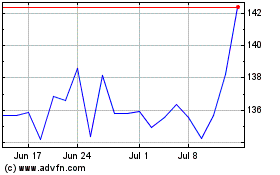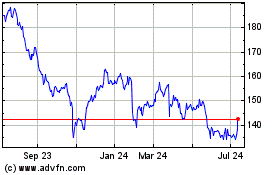UPS Gives Top Brass a Raise Despite Missed Targets
March 13 2017 - 8:58PM
Dow Jones News
By Paul Ziobro
Top executives at United Parcel Service Inc. took home higher
compensation in 2016 even as the parcel carrier missed many of its
performance targets.
The reason? A second pay raise and special stock awards given to
senior leaders, including Chief Executive David Abney, toward the
end of last year. Mr. Abney's total compensation was 21% higher
than the previous year.
The September equity awards were valued at $2.6 million for the
top five executives, according to a Securities and Exchange
Commission filing on Tuesday, and helped offset some
performance-based pay that wasn't fully paid out due to weak
results. Compensation based on the prior three years financial
results was paid out at 72% of the target.
The Atlanta-based carrier's board also boosted salaries 10% for
top executives during the September review, just six months after
the typical annual salary review in March, which increased salaries
about 4%.
UPS says the higher salary and one-time grants were designed to
keep the company's pay competitive with peers, and to also tie more
of the compensation to future performance. The stock options vest
over five years and the restricted stock awards are tied to
long-term performance targets.
"The only way the pay is delivered is if the company performs to
the target expectations," UPS spokesman Steve Gaut said. He said
the board asked consultants to review compensation in early 2016
and the board made changes in the fall when the recommendations
were available.
Mr. Abney, a four-decade UPS veteran who took over as CEO in
2014, made $13.7 million in total compensation for 2016, according
to the filing. His salary of nearly $1.1 million was 6.3% higher
than 2015. The estimated value of stock and option awards rose 22%
to $10.2 million, including long-term awards valued at $860,000
that were granted in September.
Steven Hall, founder Steven Hall & Partners, a compensation
consultant that wasn't involved in UPS's decision making, said
companies may give such awards to keep executives from considering
other offers, especially if stock options aren't as valuable as
originally expected.
"Sometimes you'll look and find there's been some lean times
because the stock hasn't moved up much," Mr. Hall said. "So we'll
offer one-time retention awards and put a lot on the table so they
don't listen to a phone call" from a competitor.
The company said its three-year performance missed targets for
revenue growth, operating return on invested capital and total
shareholder returns. Those goals were set the year Mr. Abney took
over as CEO. The company also missed some of its 2016 financial
targets.
UPS's net income fell 29% last year as rising costs to handle
the surge in e-commerce packages more than offset revenue gains.
The company's total shareholder return rose 23% during the fiscal
year, which ended Dec. 31. In January, executives lowered their
profit targets for 2017, and tempered their longer-term sales and
earnings goals.
Write to Paul Ziobro at Paul.Ziobro@wsj.com
(END) Dow Jones Newswires
March 13, 2017 20:43 ET (00:43 GMT)
Copyright (c) 2017 Dow Jones & Company, Inc.
United Parcel Service (NYSE:UPS)
Historical Stock Chart
From Mar 2024 to Apr 2024

United Parcel Service (NYSE:UPS)
Historical Stock Chart
From Apr 2023 to Apr 2024
